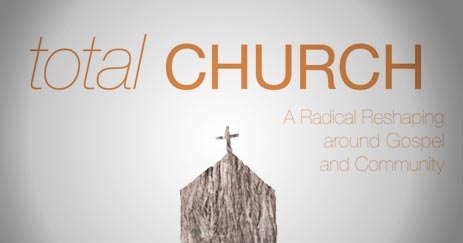
The second book I read over my vacation was Total Church: A Radical Reshaping around Gospel and Community by Steve Timmis and Tim Chester.
The overall perspective of the book is applying to the church the two foundational principles of gospel and community. As a short synopsis, it is an excellent basic theology primer coupled with an application into a decentralized, organic multiplying church movement in theory and practice. It packs a lot of punch for such a small book!
Here’s the table of contents:
- Part 1: Gospel and community in principle
- Why gospel?
- Why community?
- Part 2: Gospel and community in practice
- Evangelism
- Social involvement
- Church planting
- World mission
- Discipleship and training
- Pastoral care
- Spirituality
- Theology
- Apologetics
- Children and young people
- Success
Total Church was an excellent read from cover to cover, and chock full of material that is very useful for the theology and practice of gospel-centered missional communities. Below are a few points that I found particularly beneficial from the book.
First, the book is an excellent, balanced correction for the professionalization of ministry and calling for the participatory nature of the body of Christ. This case is made on several fronts, from developing leaders to planting churches to pastoral care. Perhaps the best view of this comes in the chapter on pastoral care, and the championing of the community as the best place for counseling, even in some very difficult issues. They make the basic argument that great damage has been done to the community of believers with the over-prescription of individualistically focused professional counseling. In removing counseling from gospel community, you are removing elements of accountability, but also relationships which provide the necessary support for enduring through difficulty.
Secondly, I thoroughly enjoyed the chapter on evangelism, and particularly the role of the gospel community as a validation of the truth claims of Scripture. They do an excellent job (although with somewhat cheesy illustrations) of demonstrating the power of the gospel community in contextualized evangelism, and the many weaknesses of more individualistic methodologies. Succinctly, they argue that the declaration of the gospel in word makes infinitely more sense as the gospel is demonstrated in the practice of a gospel-centered community.
Timmis and Chester also do an excellent job in the chapter on social involvement of instructing on the supremacy of the gospel word in gospel deed ministry. In working through issues of justice and mercy, they continually exalt highly the truth of the gospel and champion maintaining the centrality of the gospel word in this kind of ministry. I think what struck me so much about the chapter is that they do not diminish the importance of either social engagement or gospel proclamation, while calling clearly for both in proper relation to one another. They simply did not engage the “which one is more important” argument, and the chapter rang refreshing and true.
Finally, the chapter on apologetics contained a very useful synopsis of basic philosophical concepts necessary for presuppositional apologetics, and it applies a gospel lens to answering challenging, but typical questions we often face as believers in the West. I would highly recommend it if you would like to read a brief introduction to some major apologetic themes that will be immensely helpful (think of it is a very short Reason for God).
I would highly recommend that anyone read this book, as it will be beneficial from a variety of different perspectives.
In a post coming soon, I want to compare some of the concepts in Total Church with those in Vintage Church, as they were certainly interesting to read back to back.
Leave a Reply